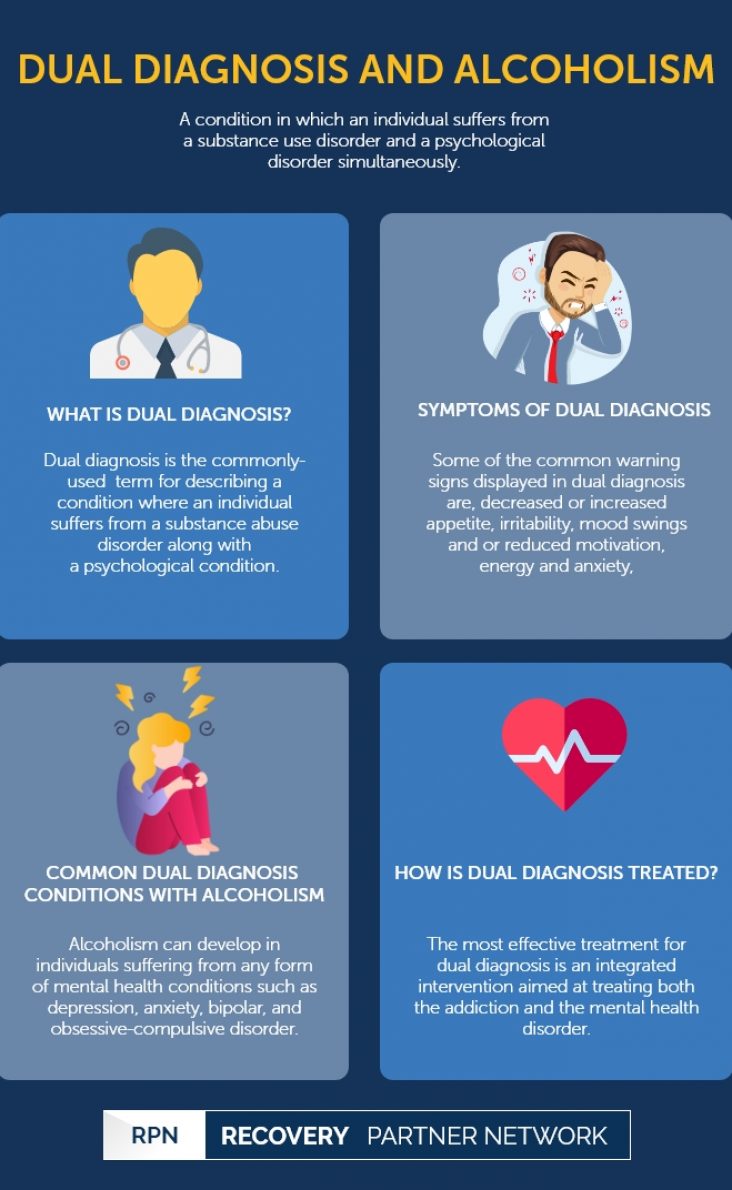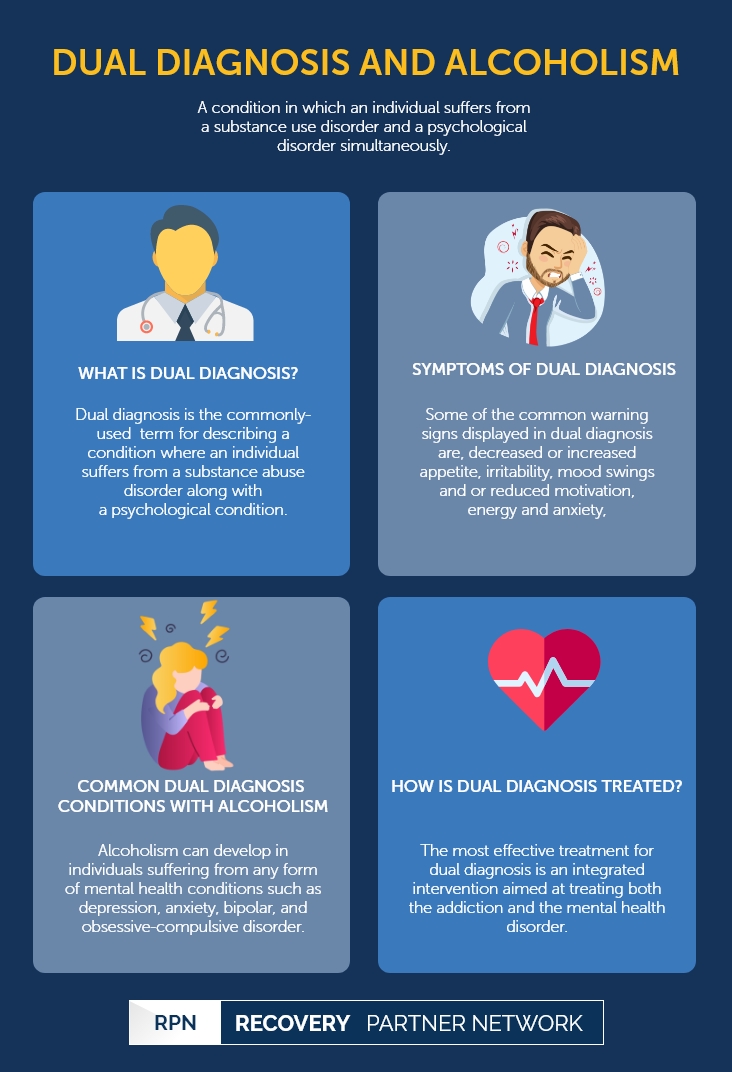A condition in which an individual suffers from a substance use disorder and a psychological disorder simultaneously.
Dual Diagnosis and Alcoholism
Alcohol dual diagnosis | Table of Contents
What is Dual Diagnosis?
Dual diagnosis is the commonly-used term for describing a condition where an individual suffers from a substance abuse disorder such as alcoholism, along with one or more mental health conditions such as depression.
This condition is also known by terms such as:
- Co-occurring disorders
- Comorbidity disorders
- Co-morbid disorders
Dual diagnosis is pretty common among individuals who abuse addictive substances. Around 7.9 million Americans have been diagnosed with this condition, and alcohol is the most commonly abused substance among these patients.
Although the risks of an alcoholic developing a mental health condition are comparatively higher than non-alcoholics, similarly, an individual with a mental health condition is more likely to become an alcoholic compared to individuals with no mental health disorders.
There is a very close and complex association between alcohol and mental health. Many individuals with mental health disorders turn towards alcohol as an escape or a form of self-medication. Many of these mental health conditions also make it quite difficult for individuals to stop drinking or consuming drugs. Consequently, the risks of these individuals developing alcoholism or other dangerous behaviors such as binge drinking are immensely high.
However, it is worth noting that alcohol actually aggravates the symptoms of many mental health conditions by bringing them on more frequently and prolonging their duration. There is a considerable number of research that suggests the role of alcoholism in causing certain mental health conditions such as depression, but those conclusions are highly controversial.
FAQ
- What does it mean to have a dual diagnosis?
- What causes dual diagnosis?
- What mental health problems does alcohol cause?
- Can alcohol change your personality?
- How do you know if you're an alcoholic?
- What is classed as an alcoholic?
A person with a dual diagnosis has both a mental health disorder and an alcohol or drug addiction simultaneously.
There remains a vicious cycle between alcohol abuse and mental health complications. Patients with mental health complications are known to self-medicate through alcohol consumption, and the prolonged abuse of alcohol can eventually lead to mental health complications.
Alcohol abuse can cause depression, anxiety, psychosis, and antisocial behavior, during intoxication and during withdrawal.
Research indicates that alcohol does not transform the overall personality, though it does tend to make people more extroverted. Alcohol can help boost an individual’s confidence and make them less self-conscious, which in turn exaggerates certain personality traits.
Some of the most common symptoms of alcohol abuse may include temporary blackouts, short-term memory loss, extreme irritability, mood swings, or always finding an excuse to consume alcohol.
Alcoholism is the most serious form of problem drinking. It describes a strong, often uncontrollable desire to drink. Sufferers of alcoholism will often place drinking above all other obligations, including work and family. Prolong abuse can develop a physical tolerance and dependence that could lead to withdrawal symptoms if they cease alcohol consumption.
Symptoms of Dual Diagnosis
Even though each mental health disorder portrays different symptoms (particularly when mixed with alcohol), there are a few symptoms that are common.
Some of the common warning signs displayed by individuals with a dual diagnosis are:
- Decreased or increased appetite
- Reduced motivation and energy
- Anxiety, irritability, and mood swings
- Difficulties in concentrating and accomplishing tasks
- Staying isolated from family and friends
- Decreased work or personal life performances
- Behavioral changes
- Making excuses to use alcohol
Common Dual Diagnosis Conditions with Alcoholism
Alcoholism can develop in individuals suffering from any form of mental health condition. Some of these mental health conditions are:
Depression is the most widely diagnosed mental health condition in today’s world, and it is also the most frequently occurring mental health condition alongside alcoholism. Individuals with depression frequently seek refuge in alcohol to alleviate some of the severe symptoms of their condition, such as hopelessness, sadness, loneliness, and suicidal thoughts. However, the long-term consequences of alcohol consumption are often paradoxical, as alcohol generally worsens symptoms of depression.
Around 18 percent of Americans experience some form of anxiety at some point in their life. These individuals are often drawn towards alcohol since drinking can momentarily calm them and divert their focus. Many individuals with social anxiety claim that alcohol makes them more confident and relaxed in social settings. Nevertheless, alcohol can aggravate anxiety over time, especially since alcohol-influenced decisions can place individuals in anxiety-filled situations.
Alcoholism and bipolar disorder pair up quite frequently. Certain studies indicate that a majority of bipolar patients develop substance abuse or addiction, particularly alcoholism, at some point in their lives. Although bipolar patients find alcohol consumption helpful in alleviating certain aspects of their lives, prolonged consumption can cause adverse consequences. Alcohol use during manic bipolar phases is particularly dangerous as it further provokes reckless and careless behaviors associated with mania.
Studies suggest that almost 25 percent of OCD patients also battle with alcohol abuse. OCD patients find alcohol highly appealing as it diverts their attention away from their symptoms. However, the symptoms of OCD can also worsen with regular alcohol use. Prolonged and regular use of alcohol can lead to the formation of dependence and addiction. The severe the symptoms get, the more an individual tends to drink and thus creating a vicious cycle between alcoholism and the aggravation of mental health disorder.
Influence of Dual Diagnosis on Treatment
The existence of dual diagnosis conditions naturally complicates the treatment process for alcoholism. Similarly, the existence of alcoholism complicates the treatment process for any mental health disorder.
Reasons for these complications may include:
- The symptoms of alcoholism and many mental illnesses are quite similar, making it difficult or nearly impossible to accurately diagnose a patient until he/she stops drinking alcohol. This is particularly true if the patient suffers from multiple mental health disorders. Thus, without proper diagnosis, effective treatment is highly unlikely.
- The treatment for both conditions itself is quite complicated. In order to magnify the chances of a successful recovery, both alcoholism and the mental health condition must be treated simultaneously. Doing so will also reduce the severity of both conditions: the lesser the individual drinks, the less frequent and severe their symptoms and the urge to drink will be. However, this requires comprehensive treatment by both mental health and addiction experts. Until recent years dual diagnosis was not addressed during addiction treatment, which left a lot of patients receiving inadequate and ineffective treatment.
Dual diagnosis can make the recovery process quite challenging for most patients, particularly for those who have not received adequate medical treatment for mental health disorders for many years. Inadequate treatment can lead to multiple relapses, which further aggravates the health of the patient. However, this does not mean that recovery is impossible. Alcoholics with dual diagnoses can lead a healthy, sober life with the proper treatment.
How is Dual Diagnosis Treated?
The most effective treatment for dual diagnosis is an integrated intervention, which is aimed at treating both the addiction and the mental health disorder. Although dual diagnosis treatment plans may vary from patient to patient, a few of the common elements of such treatments are:
- Detoxification
- Inpatient Rehabilitation
- Supportive Housing
- Psychotherapy
- Medications
- Self-Help and Support Groups
The first step of treatment begins with detoxification. This process involves the elimination of the substance within the body. Inpatient detox is safer and much more effective than outpatient for gaining initial sobriety. During inpatient detox, medical staff will provide around the clock care and supervision to help patients better manage withdrawal and treat any health conditions that may arise. Depending on the severity of the addiction, patients may adhere to the tapering down detox or be provided medically assisted detox.
A patient with a dual diagnosis may benefit the most out of inpatient rehab as it provides strict and supervised medical care. These treatment centers generally provide therapy, support, medications, and health care services to treat the substance use disorder while addressing the underlying issues.
These are residential treatment centers such as group homes or sober houses that greatly assist individuals who are newly sober in avoiding relapses.
This is a crucial element of an effective treatment plan for dual diagnosis. Cognitive-behavioral therapy (CBT) helps patients learn how to cope with triggers and cravings as well as instill positive thought processes.
These are greatly useful in treating mental health disorders. Certain medications may also help patients with substance use disorders alleviate withdrawal symptoms during the detox phase.
Battling a dual diagnosis can be quite challenging and isolating. Thus, support groups allow members to share their frustrations and successes and find referrals for specialists and community resources. They also provide a safe space for forming healthy, long-lasting relationships that encourage patients to stay clean. Few examples of these support groups are Alcoholics Anonymous (AA), Narcotics Anonymous (NA), Double Trouble in Recovery, and Smart Recovery.
Recovery Partner Network
We aim to educate and empower. If you feel our library of resources does not cover your specific need, reach out to us, and we would be happy to help.
STATISTICS
© Copyright 2026


